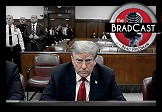Special to The BRAD BLOG by Michael Bryan from the courtroom in Tucson, AZ...
 It was an eventful day in the courtroom in Pima County yesterday, with opening statements and the first two plaintiff's witnesses' testimony. Already, the general shape of the controversy is becoming more clear and many of the media access issues have been favorably resolved. The Election Integrity press pool is providing video to local news and other interested parties on a non-exclusive basis and there is a ground-swell of support and interest in the trial and use of the resultant footage among journalists and documentarians.
It was an eventful day in the courtroom in Pima County yesterday, with opening statements and the first two plaintiff's witnesses' testimony. Already, the general shape of the controversy is becoming more clear and many of the media access issues have been favorably resolved. The Election Integrity press pool is providing video to local news and other interested parties on a non-exclusive basis and there is a ground-swell of support and interest in the trial and use of the resultant footage among journalists and documentarians.
Full summaries of the opening statements of the plaintiff's attorney Bill Risner and Pima County Deputy County Attorney Christopher Straub are available on BlogForArizona.com and they lay out the positions of the litigants.
See our initial backgrounder/intro to this trial, as posted yesterday, right here.
The position of the Democratic Party, argued in the courtroom yesterday, is that the statutory role of the political parties in Arizona, and in America historically, has been to oversee and participate deeply in our elections. The elections belong to the people, not the government. The database the party seeks access to on behalf of all political parties is the only computer record of the election that can provide the information needed to ensure that elections insiders cannot, and have not, manipulated the election. Absent a clear statement by the legislature, the parties should not be denied access to this crucial information to carry out their traditional role of ensuring the public's political rights. Certainly no tortured interpretation of outdated language regarding computer technology from a statute written in the 1980s should be allowed to deny the people access to their election data, only a clear and unambiguous expression from the legislature should be able to do that.
The position of Pima County, however, is that the database requested must remain confidential.
They argue that providing the database to the political parties would violate the standards promulgated by the Arizona Secretary of State because the files contain procedural information and code that is used to program elections machines, and could reveal information that might compromise future elections. The county agrees that the Diebold GEMS software used to tabulate votes has serious security flaws, but that is all the more reason to not allow the information in the database into the public domain...
The real purpose of this lawsuit is to force a change in the software used in elections, and that should be a legislative task, not a judicial one, the county maintained. Even if the database information were surrendered, it would do the party no good in finding fraud, since they admit that the security of the software is such that anyone who had the requisite knowledge to alter the election totals could also cover their tracks completely. Hand count audits (passed in Arizona in 2006) provide a much better method of ensuring election integrity than examination of the database. Finally, though there are security flaws in the system used in Pima County, there are security flaws in all systems certified for use in Arizona, so it better to focus on security around the machine itself than on changing the software used, the county argued.
I'm not going to comment much on Pima's position except to say that, obviously, I disagree with it. Despite that, it is in my opinion as an attorney that it is a colorable argument. It is not a very strong position legally in my view, based as it is, on what I think is over-reliance on statutory and regulatory rules that seek to regulate a very fluid and fast-moving field of endeavor (computer science), while seeming to ignore the very strong and compelling statutory and traditional role of the political parties. Not to mention making the rather absurd assertion that the government can't be both Machiavellian and stupid at the same time: the last 7 years argues eloquently that they most certainly can.
This is a bench trial, so the final determination is solely up to Judge Michael Miller. I suspect that either way Miller decides this case, he'll draw an appeal from the losing party. So far, my observation of the judge's questioning of the witnesses indicates that Judge Miller has at least a working knowledge of computers and software applications. He's asked some astute questions seeking clarification of the terms and issues surrounding software design that may prove pivotal to a decision.
The Democratic Party put on it first two witnesses Tuesday, both experts in computer programming and core members of the team of activists whose work to secure the elections in Pima County eventuated this lawsuit. The full summaries of the testimony of Dr. Tom Ryan and Mr. Michael "Mickey" Duniho are posted on my blog.
The Democratic party has presented a strong case that release of the database to all political parties following an election would not harm the security of future elections. All information in those databases would expire with the relevant the election, and much is already in the public domain. These experts assert that none of the data in the database could be used as leverage to compromise the security of a future election, which is a key contrary claim of Pima County.
One outstanding moment in the trial so far was an assertion by Mickey Duniho (a 37-year veteran programmer from the National Security Agency) that 100% of election fraud is done by insiders - he knows of no instance where an outsider 'hacked' into an election. Those with the greatest access (and Pima admits that insiders can manipulate elections and possibly cover the tracks) are the greatest risk of fraud. Both Duniho and Dr. Ryan made strong claims that the only way to confirm the integrity of elections against insider fraud is to have public access to those databases following an election.
Tomorrow, the Democrats will continue with their witnesses and may rest their case, allowing Pima to begin testimony from their witnesses. Please continue to track this case here on The BRAD BLOG and on Blog For Arizona. Please continue to leave comments with information related to this case and others like it around the county. We have already found information provided by readers to be very helpful.


 Bad Climate News for Home, Car Owners; Good Labor News for Workers in the South: 'BradCast' 4/18/24
Bad Climate News for Home, Car Owners; Good Labor News for Workers in the South: 'BradCast' 4/18/24 'Green News Report' 4/18/24
'Green News Report' 4/18/24
 SCOTUS Suddenly Worried About Overcriminalization ... for J6 Insurrectionists: 'BradCast' 4/17/24
SCOTUS Suddenly Worried About Overcriminalization ... for J6 Insurrectionists: 'BradCast' 4/17/24 'Trump Media' Plummeting, MAGA Buyers Losing Life Savings: 'BradCast' 4/16/24
'Trump Media' Plummeting, MAGA Buyers Losing Life Savings: 'BradCast' 4/16/24 'Green News Report' 4/16/24
'Green News Report' 4/16/24 Trump's First Criminal Trial, for Cheating in 2016, Begins in NY: 'BradCast' 4/15/24
Trump's First Criminal Trial, for Cheating in 2016, Begins in NY: 'BradCast' 4/15/24 Sunday 'Party Like It's 1864' Toons
Sunday 'Party Like It's 1864' Toons Biden Closes 'Gun Show Loophole'; Repubs Turn Desperate: 'BradCast' 4/11/24
Biden Closes 'Gun Show Loophole'; Repubs Turn Desperate: 'BradCast' 4/11/24  'Green News Report' 4/11/24
'Green News Report' 4/11/24 'Pink Slime': Fake 'Local News' Sites Proliferating in Advance of Election: 'BradCast' 4/10/24
'Pink Slime': Fake 'Local News' Sites Proliferating in Advance of Election: 'BradCast' 4/10/24 Dirty Tricks and the Dirtiest Candidate Of All Time: 'BradCast' 4/9/24
Dirty Tricks and the Dirtiest Candidate Of All Time: 'BradCast' 4/9/24 'Green News Report' 4/9/24
'Green News Report' 4/9/24 'Titanic Law' Reform Just Tip of Iceberg in Quest for Key Bridge Accountability: 'BradCast' 4/8/24
'Titanic Law' Reform Just Tip of Iceberg in Quest for Key Bridge Accountability: 'BradCast' 4/8/24 Sunday 'Dark Days Indeed' Toons
Sunday 'Dark Days Indeed' Toons Trump's Very Bad Day in Court(s), Other Good (& Less Good) News: 'BradCast' 4/4
Trump's Very Bad Day in Court(s), Other Good (& Less Good) News: 'BradCast' 4/4 'Green News Report' 4/4/24
'Green News Report' 4/4/24 WI Supremes May Restore Drop-Box Voting
WI Supremes May Restore Drop-Box Voting WI Voters Approve Election Crippling Ballot Measures: 'BradCast' 4/3/24
WI Voters Approve Election Crippling Ballot Measures: 'BradCast' 4/3/24  Politico's Josh Gerstein Owes a Retraction
Politico's Josh Gerstein Owes a Retraction More GOP Election Fraud; Overdue Justice for Crystal Mason: 'BradCast' 4/2/24
More GOP Election Fraud; Overdue Justice for Crystal Mason: 'BradCast' 4/2/24 Last Week Today with OG Bloggers:
Last Week Today with OG Bloggers: It's Up to You, New York: 'BradCast' 3/21/24
It's Up to You, New York: 'BradCast' 3/21/24 'It All Comes Down to Brett and Amy': 'BradCast' 3/20/24
'It All Comes Down to Brett and Amy': 'BradCast' 3/20/24 American 'Bloodbath': 'BradCast' 3/19/24
American 'Bloodbath': 'BradCast' 3/19/24
 VA GOP VOTER REG FRAUDSTER OFF HOOK
VA GOP VOTER REG FRAUDSTER OFF HOOK Criminal GOP Voter Registration Fraud Probe Expanding in VA
Criminal GOP Voter Registration Fraud Probe Expanding in VA DOJ PROBE SOUGHT AFTER VA ARREST
DOJ PROBE SOUGHT AFTER VA ARREST Arrest in VA: GOP Voter Reg Scandal Widens
Arrest in VA: GOP Voter Reg Scandal Widens ALL TOGETHER: ROVE, SPROUL, KOCHS, RNC
ALL TOGETHER: ROVE, SPROUL, KOCHS, RNC LATimes: RNC's 'Fired' Sproul Working for Repubs in 'as Many as 30 States'
LATimes: RNC's 'Fired' Sproul Working for Repubs in 'as Many as 30 States' 'Fired' Sproul Group 'Cloned', Still Working for Republicans in At Least 10 States
'Fired' Sproul Group 'Cloned', Still Working for Republicans in At Least 10 States FINALLY: FOX ON GOP REG FRAUD SCANDAL
FINALLY: FOX ON GOP REG FRAUD SCANDAL COLORADO FOLLOWS FLORIDA WITH GOP CRIMINAL INVESTIGATION
COLORADO FOLLOWS FLORIDA WITH GOP CRIMINAL INVESTIGATION CRIMINAL PROBE LAUNCHED INTO GOP VOTER REGISTRATION FRAUD SCANDAL IN FL
CRIMINAL PROBE LAUNCHED INTO GOP VOTER REGISTRATION FRAUD SCANDAL IN FL Brad Breaks PA Photo ID & GOP Registration Fraud Scandal News on Hartmann TV
Brad Breaks PA Photo ID & GOP Registration Fraud Scandal News on Hartmann TV  CAUGHT ON TAPE: COORDINATED NATIONWIDE GOP VOTER REG SCAM
CAUGHT ON TAPE: COORDINATED NATIONWIDE GOP VOTER REG SCAM CRIMINAL ELECTION FRAUD COMPLAINT FILED AGAINST GOP 'FRAUD' FIRM
CRIMINAL ELECTION FRAUD COMPLAINT FILED AGAINST GOP 'FRAUD' FIRM RICK SCOTT GETS ROLLED IN GOP REGISTRATION FRAUD SCANDAL
RICK SCOTT GETS ROLLED IN GOP REGISTRATION FRAUD SCANDAL VIDEO: Brad Breaks GOP Reg Fraud Scandal on Hartmann TV
VIDEO: Brad Breaks GOP Reg Fraud Scandal on Hartmann TV RNC FIRES NATIONAL VOTER REGISTRATION FIRM FOR FRAUD
RNC FIRES NATIONAL VOTER REGISTRATION FIRM FOR FRAUD EXCLUSIVE: Intvw w/ FL Official Who First Discovered GOP Reg Fraud
EXCLUSIVE: Intvw w/ FL Official Who First Discovered GOP Reg Fraud GOP REGISTRATION FRAUD FOUND IN FL
GOP REGISTRATION FRAUD FOUND IN FL


































